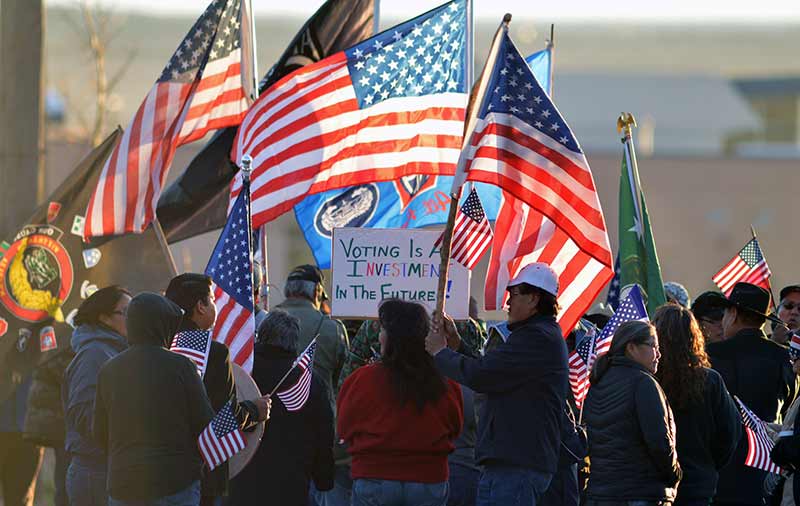
Preparations in place to hold presidential election on Tuesday

Veterans and voters prepare to walk to the Chinle District Court on Friday morning before the Navajo Supreme Court hearing in Chinle, Ariz. In part of their verbal ruling, the Supreme Court ordered the Navajo Election Administration to take Chris Deschene's name off the ballot and replace him with Russell Begaye, who received the third highest votes during the primaries. (Times photo - Donovan Quintero)
WINDOW ROCK
Navajo Nation election officials said Wednesday that everything is in order to hold the special election for tribal president on Tuesday.
Edison Wauneka, director of the Navajo Nation Election Administration, said the ballots have been printed and are expected to arrive in Window Rock on Thursday for distribution to the 110 chapters in time for Tuesday’s election between former Navajo Nation President Joe Shirley Jr., and Russell Begaye, a former council delegate from Shiprock.
But, given the strange events that have been present in this election, there is a possible bump that may have an effect on the holding of the election.
On Tuesday, Window Rock District Court Judge Carol Perry held a hearing on a complaint filed by those members of the Navajo Board of Election Supervisors who were removed last November by the Navajo Supreme Court for refusing to follow court orders to remove Chris Deschene from the ballot.
The former election officials Ð Wallace Charley, Harry Brown, Norman Begay and Ruth Watson Ð asked for a temporary restraining order to stop Tuesday’s election so that a referendum could be held first to determine the Navajo fluency question.
Perry spent three hours Tuesday hearing testimony in a case that essentially, according to one attorney, resulted in having a district court consider overturning a decision that has already been made by the Navajo Supreme Court.
Perry did not render a decision on Tuesday but said she would release it soon. But if she approves the temporary restraining order, it would put Wauneka in a very strange situation since he would be in contempt of the Navajo Supreme Court if he complies with the district court decision, and in contempt of Perry if he doesn’t.
Lee Belone, the attorney for the former election officials, stressed throughout the hearing that his case had nothing to do with the decisions made by the supreme court and was solely related to the resolution the members of the Navajo Nation Council approved in March calling for a referendum to be held on the Navajo fluency question before an election is held to fill the position of tribal president.
Complying with their request, he said, would only mean that Shirley and Begaye would run against each other after the June 9 referendum on the Navajo fluency question.
ÒWe aren’t asking for the court to allow for a write-in candidate,Ó Belone said, pointing out that tribal law prohibits a write-in candidate in special elections. Nor are they looking at other candidates being allowed to run as a result of whatever decision is made by the Navajo voters, he said.
The question then, in Perry’s mind, was why was it important to hold the election for tribal president first, and if a decision was made to have the referendum first, what affect would that have financially on the tribe’s election office.
Michael Upshaw, who represented the Navajo Nation Election Administration, said that the election office would have to reprint the ballots and reset the election machines, which would add about $260,000 to the cost of the election.
He also pointed out that the supreme court has directed the election office to hold the election on April 21.
On a technical point, he said that the request for a temporary restraining order did not meet all of the requirements under Rule 65 and therefore had to be dismissed.
But Perry called up the company that was printing the tribal ballots and Tim George, the manager of the Rio Rancho, N.M. company that was printing the ballots, said there would be no extra cost if the tribe could use the same ballots for the delayed election.
The only problem he foresaw was the fact that the ballots would have the April 21 date and if the tribe didn’t mind that, the same ballots could be used for an election in June or July.
Then the question arose why should the referendum be held first.
To answer that question, Belone had two of the former election board members, Charley and Watson, testify on their feelings.
Both basically said that they needed the results of the referendum to make an informed decision on who to vote for in the tribal president race.
Watson was questioned by Upshaw at length about her feelings concerning the ability of the current candidates for tribal president to speak Navajo and she said she had nothing against any of the current candidates.
He then pointed out that Navajos have been making decisions of who they want to vote for in past presidential elections without having the benefit of a referendum on the question.
Perry’s decision is expected to come down sometime this week. If she approves the temporary restraining order and calls for the delay of the tribal election, attorneys for Hank Whitethorne and Dale Tsosie are expected to be back before the Navajo Supreme Court within hours to get the decision overturned.
To read the full article, pick up your copy of the Navajo Times at your nearest newsstand Thursday mornings!
Are you a digital subscriber? Read the most recent three weeks of stories by logging in to your online account.








 Highway 264,
Highway 264, I-40, WB @ Winslow
I-40, WB @ Winslow